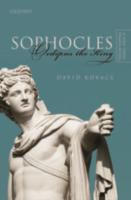
OUP (2020) p/b 107pp £12.00 (ISBN 9780198854845)
David Kovacs is well-known for his sterling and valuable work in translating all the plays of Euripides for the Loeb Library; his intention here is rather different. The translation is based upon the joint work of H. Lloyd-Jones and N. Wilson (OUP 1992). K. lists all the places (not very many) where he differs from their text (ideally, one would have the Greek text to hand, but it is not, of course, provided here). He has chosen to use a loose form of blank verse for the spoken sections, but takes a more ‘poetic’ approach for the choruses. The result reads easily, but—as seems inevitable with translations of Greek drama which adhere closely to the original—it does not lend itself to attractive stage performance (Gilbert Murray’s popular old stage versions wandered far from the Greek, and earned the epithet ‘sub-Swinburnian’). Even so famous a line as that in which Oedipus berates the blindness of the seer Teiresias with a splutter of τs is all too bland in K.’s version.
The primary purpose of the book, says K., is ‘to provide a clear, accurate, and readable translation of the play’: he has succeeded. The notes are invariably helpful in explaining what is going on, and why, e.g. 123: ‘This is a lie on the part of the survivor (which) helps Sophocles to delay Oedipus’s discovery that he has killed Laius until it is also clear that Laius is his father’; 233: Oedipus’s order that the ‘Thebans excommunicate the murderer is irrational’; K. backs this up with two reasons, and explains why Sophocles may have permitted the irrationalities involved; 730: ‘Sophocles’s plot takes precedence over the natural behaviour of his characters’). In so complex a play, K.’s notes are as necessary in themselves as is the welcome clarity with which they are expressed.
But it is not in the translation that this slim book ‘punches above its weight’. I turn now to two features of the Introduction. Section 3 is headed: ‘The divine dimension: on not misunderstanding Oedipus the King’. The reference is of course to the justly famous article by E.R. Dodds of 1966. However, K. takes issue with Dodds on one central, indeed vital point: whereas Dodds argued that Apollo had merely predicted what the fate of Oedipus would be, leaving Oedipus with power over his actions (of which the outcome was, nevertheless, certain), K. believes that Apollo’s role was far more active—that, for example, he deliberately set Oedipus up to kill his father and marry his mother; and, indeed, that Apollo was at work not only before the play begins, but during it. K. argues his case in detail from the actual words of the play, and the reviewer believes that it provides a powerful ‘antiphony’ to Dodds.
The other important feature of the introduction (Section 5: ‘The Ending’) lies in K.’s treatment of the ‘problematic’ ending, where it is certain that something is wrong with our text as transmitted, especially from the dramaturgical point of view. In essence, K. believes that not many lines are missing (he supplies them, exempli gratia, after line 1467); the ending as passed down is, in K.’s opinion, a later addition to the play, which he nonetheless translates as lines 1468 to 1530. The argument is convincing, and deserves to be studied with care: it remains a contentious subject.
There is a succinct Bibliography and a short Index. The price of the hardback edition seems exorbitant for so slim a volume; the paperback price, happily, is acceptable, and should encourage its widespread and deserved purchase. For anyone seeking a Greek text, Hugh Lloyd-Jones’s volume 1 of the Loeb Sophocles (1994) is readily available; the most recent commentary is that of P.J. Finglass (CUP 2018).
Colin Leach
